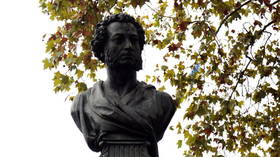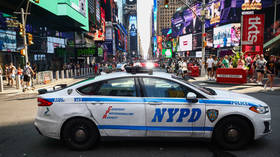New York sees lowest Covid-19 death toll in April, but reopening would require ‘ARMY’ for contact tracing and more tests
New York had its lowest death toll from Covid-19 since April 1, but Governor Andrew Cuomo warned a lot is still required before the state can start to reopen, including an ‘army’ of tracers and more coronavirus tests.
Though announcing 540 new Covid-19 deaths at his daily press briefing represents a fairly sharp decline from past weeks, Cuomo warned the numbers are still “soul-crushing,” and coronavirus hospitalization rates remain steady at about 2,000 new patients a day.
Remember: We still have about 2,000 new COVID hospitalizations daily.And we lost 540 New Yorkers yesterday. That is a soul-crushing loss.When you feel tired of social distancing, think of those we lost. That's what's at stake here.
— Andrew Cuomo (@NYGovCuomo) April 18, 2020
The governor also stressed the decline in the death toll does not mean the state is any closer to reopening and easing lockdown restrictions in place as more testing and tracing of the virus needs to be done.
But the state’s labs are struggling to get more access testing materials.
“We asked the top 50 labs in NYS what they would need to double their testing. They all said the same thing: They need more chemical reagents,” Cuomo said, adding, “We need the federal government to oversee the supply chain and help get labs what they need.”
On tracing, which is an investigation into the origins of a disease through interviews with positive cases, Cuomo says his state is also falling short and needs an “army of thousands” to complete the task.
We asked the top 50 labs in NYS what they would need to double their testing.They all said the same thing: They need more chemical reagents.We need the federal government to oversee the supply chain and help get labs what they need.
— Andrew Cuomo (@NYGovCuomo) April 18, 2020
Testing and tracing, the governor insists, is the way to offset the disease, and he used a former Covid-19 “cluster” spot in New Rochelle, New York as an example of this. The hotspot was “cooled” through “testing and tracing,” but Cuomo insists his state needs more funding and coordination from the federal government to scale up both testing and tracing.
Some US states have begun mulling slowly easing back lockdown restrictions following President Donald Trump announcing a slow reopening of the economy in May.
Also on rt.com ‘We’re being held hostage!’ Minnesota governor eases coronavirus lockdown after angry outcry from #ReopenMN protestersTexas and Minnesota willing be slowly pulling back restrictions on the public in coming days, and Florida already saw hordes of citizens flock to beaches after announcing a soft reopening on Friday night, allowing for a few hours of recreational activity a day for citizens by reopening some public spaces like parks.
When it comes to tracing the spread of coronavirus, the potential answer for some is using contact apps to avoid a situation where “thousands” of investigators are required to interview positive Covid-19 cases. Apple and Google have teamed up to try and create an effective app, and nations like Australia are hard at work pushing just such a system to the public. A contact tracing app would track every person who has encountered someone confirmed to have had the coronavirus.
Also on rt.com Covid-19 much more widespread than thought, and NO MORE DEADLY THAN FLU, new Stanford study suggestsThe reliance on an app has raised several issues, however, including how willing the public would be to cooperate. A study conducted at the University of Oxford created a simulation city of one million people and found that a tracing app would only be effective if 80 percent of the population willingly downloaded it.
Privacy concerns have also arisen, as an app monitoring your proximity to positive coronavirus cases would provide yet another metric of your life tracked by technology companies. Apple and Google have tried addressing these fears by insisting they are adding new security features that would make the app a Bluetooth-only system that does not collect and store data on its own servers, and would not collect any personal data from those who are free of the virus. Critics have still pointed to a list of potential problems, such as faulty signals between phones, vulnerability to hackers, and mistaken false-positive tests.
If you like this story, share it with a friend!














